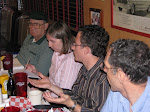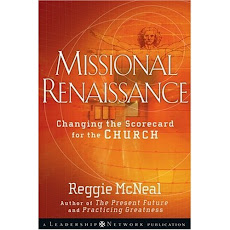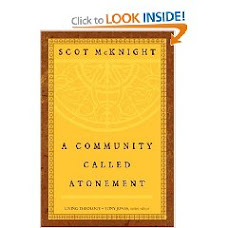 Scot McKnight is the author of numerous books with an emerging and missional Christian perspective, such as A Community Called Atonement and The Blue Parakeet: Rethinking How You Read the Bible. He also wrote the article Five Streams of the Emerging Church which we started this cohort with. On Scot’s award winning Jesus Creed blog, he has a new series on Kingdom Gospel. The focus is on the community aspect of the Kingdom and how that is missing from too many evangelical Gospel presentations. Along with our current discussion about postmodernism and our upcoming focus on community, I was inspired enough by Scot’s post to re-post it below with permission.
Scot McKnight is the author of numerous books with an emerging and missional Christian perspective, such as A Community Called Atonement and The Blue Parakeet: Rethinking How You Read the Bible. He also wrote the article Five Streams of the Emerging Church which we started this cohort with. On Scot’s award winning Jesus Creed blog, he has a new series on Kingdom Gospel. The focus is on the community aspect of the Kingdom and how that is missing from too many evangelical Gospel presentations. Along with our current discussion about postmodernism and our upcoming focus on community, I was inspired enough by Scot’s post to re-post it below with permission.Some of the resources by McKnight mentioned above, and others, are linked at the left sidebar.
******************************************************************************
Kingdom Gospel 1
Monday May 11, 2009
If "kingdom" is the solution, what is the problem?
Jesus' gospel message of the kingdom of God is itself a blue parakeet for many today. In fact, many have tamed Jesus' blue parakeet message of the kingdom and this chapter may well provide a reason why some feel this way. Encountering Jesus' kingdom gospel not only makes us think, but it makes us think we just might have gotten lots of things wrong. It makes us rethink how we are reading the Bible. It makes us think about what the gospel itself is. It also makes us back up to the elements of the Story - creation, cracked Eikons, covenant community, Christ, and consummation - and see which of these elements are the focus of Jesus' own preaching. In this chapter we will examine how Luke tells the Story and we will see that his focus is squarely on two elements, Christ and covenant community. Some are surprised by what they see when they read Luke's Gospel.
I grew up on a gospel that was neat and trim; it was clear and simple. The more I read the Bible the more convinced I became, though, that something was wrong on center court. When some folks read the Bible, they only want to see creation, cracked Eikons, Christ and the consummation (heaven).
The gospel that deconstructs church
Many readers of the Bible read the whole Bible through the lens of the gospel they believe and this is what that gospel looks like:
God loves you and has a wonderful plan for your life.
But you have a sin problem that separates you from God.
The good news is that Jesus came to die for your sins.
If you accept Jesus' death, you can be reconnected to God.
Those who are reconnected to God will live in heaven with God.
Every line of that statement is more or less true. It is the sequencing of those lines, the "story" of that gospel if you will, that concerns me and that turns Jesus' message of the kingdom into a blue parakeet. And it is not only the sequencing, it is the omitting of major themes in the Bible that concerns me. What most shocks the one who reads the Bible as Story, where the focus is overwhelmingly on God forming a covenant community, is that this outline of the gospel above does two things: it eliminates community and it turns the entire gospel into a "me and God" or "God and me" gospel. Who needs a church if this is the gospel? (Answer: no one.) What becomes of the church for this gospel? (Answer: an organization for those who want to do that sort of thing.) While every line in this gospel is more or less true, what concerns many of us today is that this gospel makes the church unimportant.
I believe this gospel can deconstruct, is deconstructing, and will deconstruct the church if we don't change it now. Our churches are filled with Christians who don't give a rip about church life and we have a young generation who, in some cases, care so much about the Church they can't attend a local church because too many local churches are shaped too much by the gospel I outlined above. To be truthful, the gospel above is a distortion of Romans. More and more of us, because we are reading the Bible as Story, are seeing the centrality of the church in God's plan and the gospel being preached too often is out of touch with the Bible's Story.
Yes, Jesus said something like every one of those lines though he never packaged them quite like that. (Nor did Paul in Romans, to be honest.) Is this the gospel? Yes, this gospel is right. The problem is that it isn't right enough. I can give a bundle of problems with this packaging of the gospel, but it all comes down to one big problem: this gospel above isn't the Bible's Story. It is like taking five stars from the sky, knocking them out of their orbits and solar location, and lining them up like ducks in a row and then saying, "Here's our starry sky!" The only way to understand stars is to learn their location and their history and their connections and let each star shine in its place in the sky - and the only way to read the Bible is is from front to back. It doesn't make sense if we don't read the whole thing and to see how each chapter relates to the whole Story. Once we do we come to terms with the gospel that emerges from the Bible's Story.
If reading the Bible as Story teaches us anything, and we need to emphasize this one more time, it teaches us that God's work in this world is to form communities that visibly demonstrate the power of God at work in this world.
**************************************************************************
The comments are also WELL worth a read here where you can also navigate to the original post and the other posts in this excellent daily series. Join in the Jesus Creed on-line community conversation, or leave a comment here.
Blessings,
Steve













